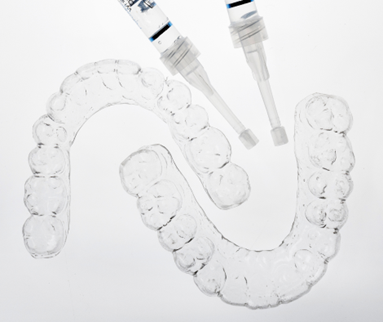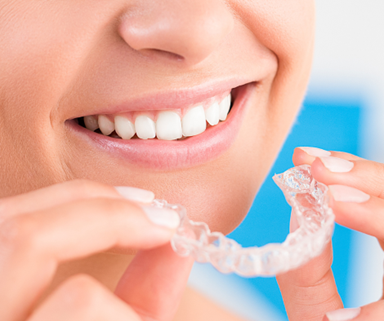Teeth whitening has without doubt become one of our most popular cosmetic treatments in recent years, and it’s not difficult to see why! Professional teeth whitening offers a safe and effective way to significantly improve the aesthetic appearance of your smile.
If you are interested in professional teeth whitening, but are not sure what’s involved or where to start, this comprehensive guide will answer some of our patients’ most commonly asked questions about this popular treatment.
How does teeth whitening work?
Enamel, the thin outer layer of the tooth, can become stained over time due to the foods and drinks we consume. Enamel also becomes thinner as we age which allows more dentin, the darker inner layer of the tooth, to show through, causing the teeth to appear darker.
Teeth whitening works by removing the discolouration and staining from both the outer (enamel) and inner (dentin) layer of the teeth, revealing a brighter smile.

What types of teeth whitening are available at Renmore Dental?
We offer a custom at-home teeth whitening kit, the Opalescence™ Home Whitening System, which is suitable for the majority of patients who are looking to brighten their smile.
We also offer non-vital whitening (internal bleaching), suitable for an individual tooth which may have darkened as a result of trauma or treatment (e.g. following root canal treatment).
This guide will focus on our at-home teeth whitening kit as this is our most popular whitening treatment; however more information on our non-vital whitening treatments can be found in a separate blog.
What exactly does the process of teeth whitening involve?
At Renmore Dental, we always start with a full dental examination before any whitening treatment. This is to ensure that there are no outstanding dental issues (for example decay, poor oral hygiene) that need to be addressed before we can provide our teeth whitening treatment. Once any outstanding dental work has been completed (if necessary), a quick impression appointment is required, during which the dentist takes a mould of your teeth (this can be either physical alginate impressions, or digital impressions using a 3D scanner, depending on your clinician).
The impressions are then sent directly to a premium dental lab, who create a custom set of teeth whitening trays, specifically designed to fit your teeth. Once your custom trays have returned to us from the dental lab, you will need a second appointment to fit the trays, during which your dentist will demonstrate the whitening process for you, provide you with our at-home whitening kit, and explain exactly how to achieve the optimum whitening results.

Once you have received your at-home whitening kit and custom whitening trays, you will then whiten your teeth at home using the specially-formulated gels provided. Your dentist will always recommend the ideal length of treatment for you; generally we recommend that patients whiten their teeth by wearing their trays overnight while sleeping, every night for a period of 14 days, however your dentist may recommend less or more than this depending on your current shade, and your desired level of whitening.
A great advantage of whitening at home means that the resulting shade is completely up to you; you can alter the length of the treatment to achieve your ideal results, whether you want to slightly enhance the shade of your teeth while maintaining a natural look, or you are looking for that brilliant white smile, you can decide what works best for you!
How do I know if I am suitable for teeth whitening?
Teeth whitening is a safe and effective way for many patients to whiten their teeth, however results will vary based on the individual’s current level of staining, and their desired shade.
It is important to note that any previous dental work that has already been completed such as fillings, crowns, composite bonding, veneers and bridges will not whiten; if you have had extensive dental treatment in the past, it is always best to discuss this during a consultation with one of our dentists to determine if teeth whitening is a suitable treatment for you.
Does teeth whitening cause sensitivity?
The teeth whitening treatments we offer are perfectly safe and cause no harm to the teeth, however patients may experience some sensitivity during the whitening process. This sensitivity is temporary, and will subside following completion of treatment.
How do I alleviate sensitivity during teeth whitening treatment?
Your dentist will provide you with expert advice on how to alleviate sensitivity during the whitening process, but generally speaking there are a few tips you can follow to help limit sensitivity during this treatment:
- It is important not to overfill the whitening trays with gel; only a minimal amount of gel is required for each tooth section, and there should be no excess gel spilling out onto the gums once inserted over your teeth (your dentist will demonstrate the correct amount of gel during your fit appointment).
- We would recommend to start brushing with a sensitivity-reducing toothpaste (Sensodyne, Colgate Instant-Relief, etc.) at least 2 weeks before starting teeth whitening treatment, as well as during and for about 2 weeks after treatment.
- Applying sensitivity-reducing toothpaste or a topical gel formulated for hypersensitivity (such as GC Tooth Mousse) directly onto any teeth affected and leaving to permeate will also help reduce sensitivity.
- If required, over the counter painkillers (whichever you would normally use for a mild headache, for example), can be taken 30 minutes before inserting your whitening trays.
- If a particular tooth shows more severe sensitivity, the whitening gel can be left out of the tray in that region for a night to allow the area to settle.
- If all teeth are very sensitive, you can fill your whitening trays with sensitivity-reducing toothpaste, or GC Tooth Mousse and keep in place for 1 hour, prior to whitening as normal.
How long do the results of teeth whitening last?
At-home teeth whitening provides a stable and lasting result, long after the initial course of teeth whitening is finished. Of course, factors such as genetics, age, diet and lifestyle (smoking, tea and coffee consumption, etc.) may affect the longevity of results, however for most patients the results are long-lasting and easily maintained.
To see the results of our whitening treatment, check out our Gallery.
How do I maintain the whitening result I have achieved?
The most important aspect of maintaining superb whitening results is an excellent oral hygiene routine. Even after whitening, normal staining from the food and drinks we consume (tea, coffee, red wine, curry, etc.) will build back up on the teeth; however this is easily removed during routine scale and polish appointments, so it is important to keep up your regular hygienist visits.
Once you have completed the initial course of whitening at home, a monthly top-up (sold separately at reception) is also required to maintain your desired shade of whitening; we recommend topping up one night per month to keep your smile bright.
When should I avoid whitening my teeth?
Generally we would not recommend whitening your teeth if you are currently pregnant or breastfeeding, undergoing orthodontic treatment/Invisalign, have active decay or cavities, or are suffering from any severe gum sensitivity, gingival recession or periodontal disease, etc.
If you are unsure if whitening would be a suitable treatment for you, or if you have whitened your teeth in the past and are wondering if you are still suitable to continue with regular top-up treatments, it is always best to consult with your dentist first.
How much does teeth whitening cost?
Our at-home teeth whitening kit costs €350.00; which includes upper and lower custom whitening trays, as well as the complete course of whitening gels. Top up gels that are required after the initial course is complete are available at the practice at a cost of €20.00 per syringe.
Our non-vital (internal) bleaching for an individual tooth starts from €400.00 per tooth, dependant on the individuals’ treatment plan; therefore we always recommend a dedicated consultation with one of our clinicians to receive an accurate quotation and discuss the treatment options that are right for you.
Can I use over the counter whitening products (whitening strips, whitening toothpastes) to achieve the same result as professional whitening?
As the popularity of teeth whitening treatments has grown exponentially over the last few years, so too has the variety of teeth whitening products available over the counter. While these products, such as whitening strips, whitening toothpastes, and whitening powders claim to provide results with active ingredients, it is important to note that there is a significant difference between the products available to everyone in a local supermarket or pharmacy, and the professional whitening products provided to a patient by a qualified dentist.
The main active ingredient you will find in most whitening products is called hydrogen peroxide, a chemical compound which is highly effective for teeth whitening. Most teeth whitening products now contain a derivative of hydrogen peroxide, called carbamide peroxide, as it provides the same fantastic results with more stability, and less sensitivity then hydrogen peroxide itself.
Ireland has strict rules regarding how much hydrogen peroxide a product can contain when sold to the general public; this means those whitening strips that claim to whiten your teeth can only contain 0.1% hydrogen peroxide. However, when whitening products are provided to a patient by a professional in a clinical setting, 6% hydrogen peroxide is the limit a whitening product can contain (equivalent 16% carbamide peroxide), as dentists can ensure their patients have been provided with the correct product for them, and clear instructions for use.
So as you can imagine, the strength of a 6% whitening gel is going to provide a vastly different result to a whitening strip with just 0.1% of the active ingredient!
So what do these over-the-counter products actually do instead?
These whitening strips and toothpastes often rely on other agents to create a whitening result, mainly by removing a thin layer from the surface of your tooth to remove staining- this will provide results in short term, but over time this will wear away enamel and often cause teeth to go darker, as the layer of dark dentin under the enamel becomes exposed, leading to sensitivity issues.
Therefore, while short term results may be tempting; these products do not truly whiten your teeth, and can be damaging long-term. Simply put, there is just no over the counter whitening product that can provide the same stable, safe and long-lasting results that are achieved through professional, clinical grade teeth whitening gel systems.
How do I start the teeth whitening process?
If you are interested in professional teeth whitening, we would love to hear from you! We would recommend booking a dedicated consultation with one of our clinicians to discuss which whitening option would be best for you; contact our patient care team on 091 757 678 or email info@renmoredental.ie for more information.
